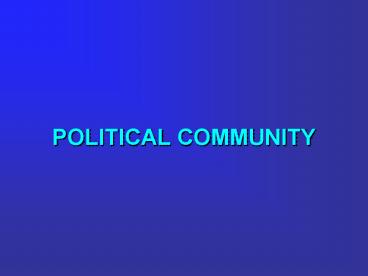POLITICAL COMMUNITY - PowerPoint PPT Presentation
1 / 24
Title:
POLITICAL COMMUNITY
Description:
membership from vantage point of the system ... The identification of individuals with a political community effects: ... Idiom = group difference ... – PowerPoint PPT presentation
Number of Views:412
Avg rating:3.0/5.0
Title: POLITICAL COMMUNITY
1
POLITICAL COMMUNITY
2
POLITICAL COMMUNITY
The collectivity for which the political system
allocates values
3
Two Aspects of Political Community
- Structural system 's boundaries
- territorial (borders) or social (citizenship)
- membership from vantage point of the system
- Psychological a person's subjective identity
(membership) - membership from vantage point of the individual
4
The identification of individuals with a
political community effects
- the way interests are perceived
- demands
- intensity of conflicts
- compliance
5
What is a nation?
How does it differ from other forms of political
community?
Loyalty of a special type
A Nation is a Terminal Political Community
6
Nation A terminal political community
A community that commands ultimate loyalty,
overriding claims of smaller collectivities which
are included within it, and excluding claims of
collectivities that are external to it, or cut
across it. Rupert Emerson From
Empire to Nation
7
A nation is an "imagined" community
8
Three bases of nationhood Three
types of nations
- ETHNO-NATION (common origin, kinship)
- Eg. Serbia, Croatia, Germany
- THEOCRATIC NATION (religion)
- Eg. Iran
- CIVIC NATION (individual volition)
- Eg. United States
9
A nation is socially constructed
10
How nations are socially "constructed"
scarce resources
competition and conflict
organization for collective action
terminal collectivity (nation)
11
What is the relationship of nations to states?
- Nation-states exist when the boundaries of a
state-type regime coincide with a terminal
political community.
- Multinational states exist when there exists more
than one terminal political community within a
state-type regime.
12
Multi-national State
13
(No Transcript)
14
Rise of Ethnic Communalism
- CONDITION ONE-- correspondence between cultural
difference and access to scarce resources - CONDITION TWO-- presence of "ethnic
entrepreneurs" - CONDITION THREE-- exclusivist political
organization - CONDITION FOUR-- environment conducive to
culturally exclusive mobilization and organization
15
Organization
Environment
resources
politics of empathy
politics of communalism
separatism
ticket balancing
16
Electoral System PR Proportional Representation
Electoral System Single Member Plurality
Communal Party 25 of vote 0 seats in
legislature
Communal Party 25 of vote 25 seats in
legislature
17
What produces Politics of Communalism?
(4)
conducive
environment
ideology
political
cultural
scarce
organization
leadership
values
difference
consciousness
(2)
(3)
(1)
mobilization
raising
18
(No Transcript)
19
Consequences of multiple terminal political
communities
Multinational State
Politics of Communalism
Ethnic Mobilization
20
Ethnic Mobilization
- Focus in-group solidarity (unity)
- Idiom group difference
- stress on commonality within the group and
differentiation from outsiders - stress on threat from outgroups- the danger of
domination - To avoid domination by ethnic outsiders, unity of
the ethnic group is presented as essential.
21
Characteristics of Communalism
- Intense (violent) conflict
- domestic politics takes on characteristics of
international politics - compromise is difficult
- competition is warlike
- differences are between strangers
- conflict is "zero-sum"
- we versus them
22
Characteristics of Communalism, con't
- A politics of collective punishment
- Secession
- Hostile environment for democracy
- elections centrifugal mobilization
- elite counter-action
- single-party state
- managed electoral competition
- power-sharing (consociationalism)
23
Consociationalism
- 1. Proportional Representation
- 2. Grand Coalition
- 3. Mutual Veto
- Requires a) Agreement among communal elites
- b) Absence of mass mobilization
24
Characteristics of Communalism, con't
- Threat to economic development
- impediment to mobilizing sacrifice
- resource transfers are politically explosive
- economically irrational allocation of resources































